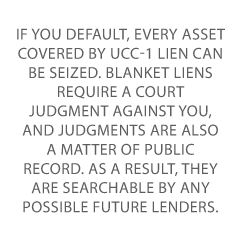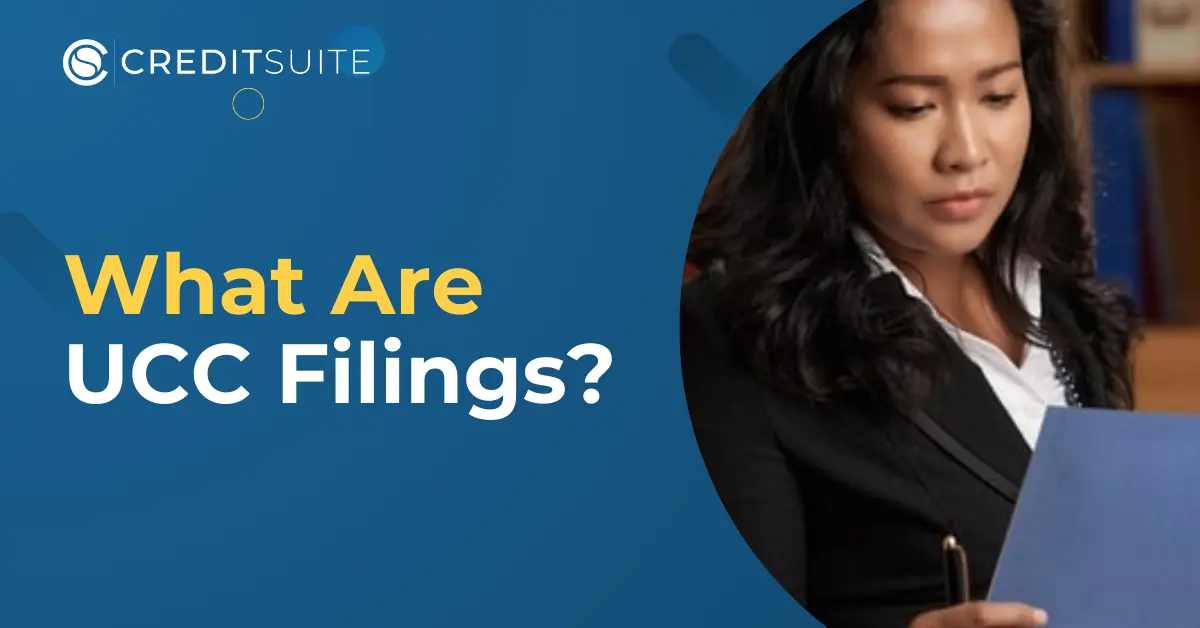Sometimes business funding is blocked by something we don’t see coming. For example, UCC filings can cause issues when you don’t even know they are out there, let alone what they are.
What Are UCC Filings?
UCC stands for the Uniform Commercial Code. This is a law covering commercial transactions in the United States. UCC filing starts when a company agrees to pledge assets to a lender.
Then, all parties sign the agreement. The lender is then free to file a UCC lien against those assets.
The lender files a UCC-1 financing statement with the Secretary of State, which creates a lien. Like many things in life, a lien is first come, first served.
That means, if two lenders try to take a lien on the same property, the one who files first will get priority if the borrower defaults on the loans.
You Can’t Hide a Lien
Liens are a matter of public record, meaning anyone can find out they are out there. So, it is important to understand how they are used. First, they’re used to protect creditors.
Lenders can take the assets they have a lien on to make a debt whole in case of default. To avoid having a second lien, they can easily run a search for any outstanding liens.
In fact, many states offer these searches online for reasonable fees.
They also allow for a business to borrow from more than one lender if specific collateral is different for each UCC-1 financing statement.
Specific collateral liens are more common for special purposes like inventory financing or buying equipment.
A UCC Lien Filing Example
Here’s an example of how an UCC financing statement may work. Say you want to purchase a new yogurt machine for your frozen yogurt shop.
You need a loan for the machine, so you go to a lender. You pledget the asset, the yogurt machine, as security for the loan.
After you and the lender sign the agreement, the lender can file a UCC 1 financing statement with the secretary of state.
Now, after a few months you want to do some updates, and you go to a different lender to get a loan for that.
You agree to use all of your yogurt machines, in addition to other assets, as security for this new loan.
When the new lender does a search, the UCC 1 filing on the machine shows up.
As a result, you may not be able to get the full loan amount without finding something else to replace the security provided by that machine.
Another option may be to approach the first lender and ask about changing the security for the first loan.
If they agree, they may file an amendment to the first UCC filing.
Then, you would be free to use all the yogurt machines as security for the second loan.
What You Should Know About UCC Filings
A UCC-1 filing is active for five years. After that, it must be renewed by the lender if the loan term is longer. Also, a lender can also file updates to a UCC-1 in case of asset changes.
Typical assets subject to UCCs include:
- Receivables
- Office equipment
- Real estate
- Investment securities
- Inventory
- Vehicles
- Larger operating equipment
- Letters of credit
- Commercial instruments (usually promissory notes or drafts)
A lender can also get a blanket assignment, which lets a borrower legally transfer ownership of present and future accounts receivable as loan collateral.
The creditor has a security interest in every business asset with a blanket assignment. These are more common when it comes to:
- Traditional bank loans
- Alternative business loans
- Loans from the SBA
Effects of UCC Filings on Funding
So, how do these liens affect funding? Well, if you default, every asset covered by UCC-1 lien can be seized. Blanket liens require a court judgment against you, and judgments are also a matter of public record.
As a result, they are searchable by any possible future lenders.
The moral of this story is, use the liens wisely. Lenders will know, due to the fact that they can search for judgments. In addition, the SBFE also has info on any UCC liens.
They may affect your ability to get a loan if your only collateral already has a lien.
How UCC Filings Affect Your Business Credit
This is a confusing question for some due simply to terminology. Business credit sometimes refers to your business credit score.
But actually, business credit is credit you get in the name of your business. So, a business credit card or a business loan are considered business credit.
A Uniform Commercial Code filing is not technically going to affect your business credit score in most cases.
However, it may show up on your business credit report, and it can definitely affect your ability to get a business loan.
If you are trying to use assets to secure a business loan, whether personal property or business property, and there is a UCC lien against those assets, your ability to get the loan may be hindered.
It doesn’t mean that you will not be able to get financing. However, it does mean you may not get as much money.
Or, the terms may not be as favorable as they would be otherwise.
Even if somehow a UCC filing does not show up on your business credit report, UCC records are easy to access. It’ll come up.
What Can You Do?
First, avoid UCC filings when you can. That means looking for non-collateral funding options. For example, the Credit Line Hybrid is unsecured funding that can have an even better interest rate than a secured loan.
It’s a good option for startups. Even better, it may report to some business CRAs. Consequently, you may build business credit using this type of funding. There is no personal guarantee requirement with the Credit Line Hybrid.
Now, you do need a good credit score , or a guarantor with good credit (700+). Yet, you do not have to provide any financials.
Business Credit Cards
These are universal-type credit cards, like MasterCard, that can be used pretty much anywhere. They may offer a rewards program. Still, review rewards programs thoroughly, as they may not be relative or attainable for your business.
These types of cards usually offer revolving terms. However, there are some out there that are more like net financing, since you cannot carry a balance. Typically, these are referred to as corporate cards.
To qualify for either, you usually need fourteen or more accounts reporting. Also, there is usually a longer time in business requirements. Furthermore, there may be a minimum number of employees requirement.
How Do I Get Rid of a UCC Filing?
To have a UCC filing against business assets removed, you have to pay-off the loan.
Then, you should go straight to the lender and request that they file a UCC form. This will be a UCC-3 form to terminate the lien.
If they refuse to do so, you can go to the Secretary of State’s office yourself.
You’ll have to swear under oath that you have paid off the loan and that the creditor no longer has any claim on the asset.
It’s important to realize that this will not necessarily trigger the removal of the lien from your business credit reports.
For example, Dun & Bradstreet will not remove a UCC lien until the customer requests it be removed or it has been inactive for 11 years.
Be sure to keep an eye on your business credit reports. This is where business credit monitoring is crucial.
If you see a UCC filing that should not be there, appeal to have it removed.
You can also appeal to have other inaccuracies removed, ensuring your business credit report gives a true picture of the creditworthiness of your business.
UCC Filings Can Affect Your Ability to Get Business Financing
UCC liens aren’t bad in and of themselves. They can be necessary when it comes to providing collateral for a loan. You have to use them wisely though.
If you have too many liens, or just more than one on a specific asset, you may have trouble getting a loan. There are other options for business funding however. Let us show you!


